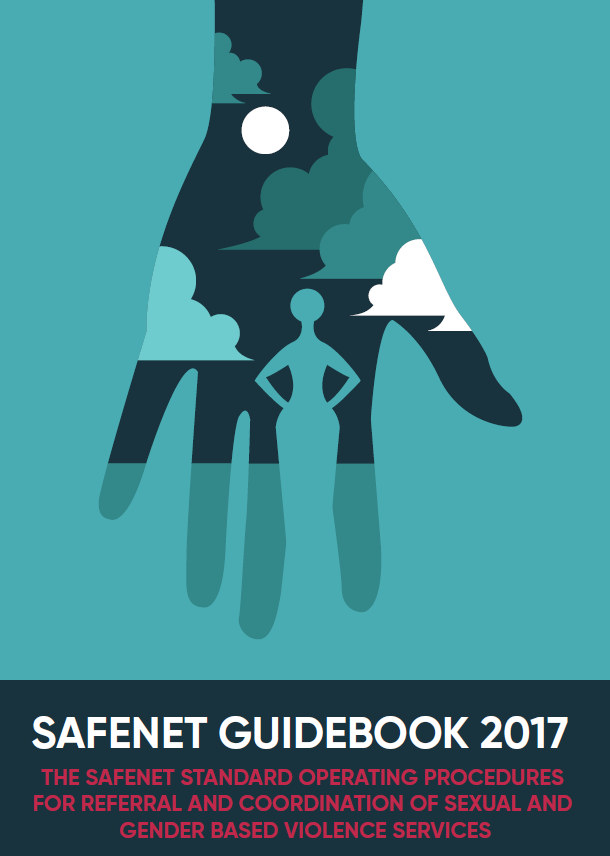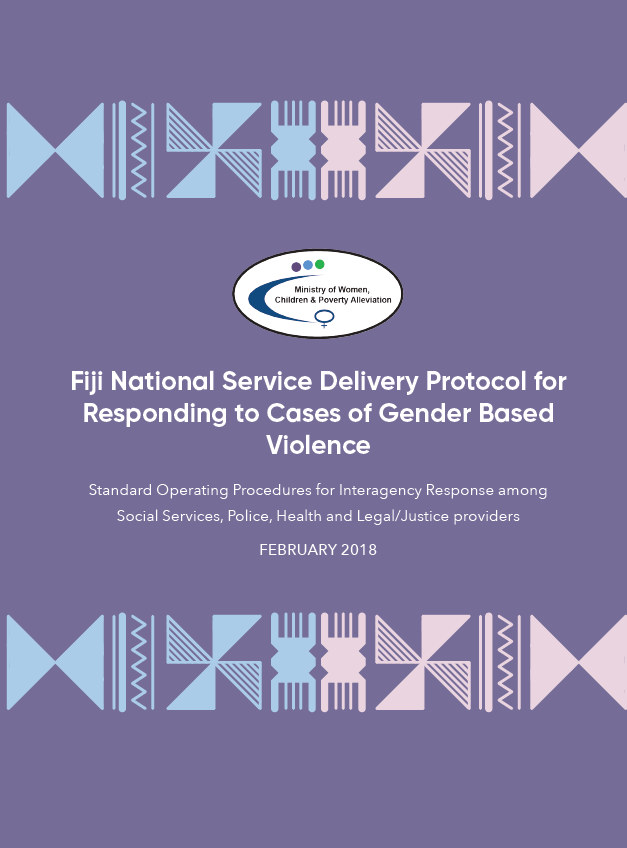Better Response Services for Survivors of Gender-Based Violence
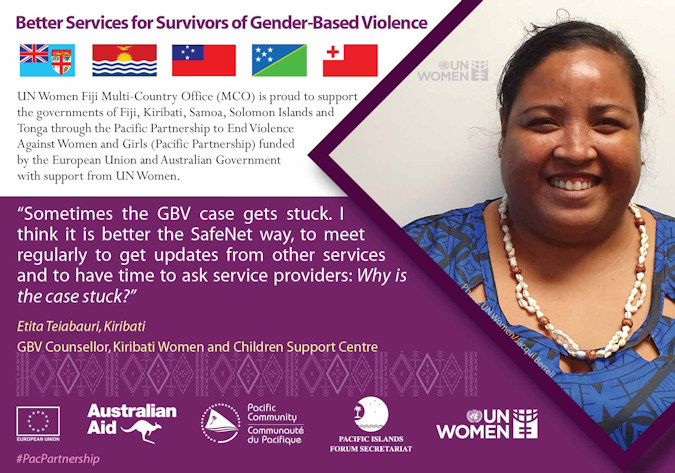
UN Women Fiji Multi-Country Office (MCO) proudly supports five governments in the Pacific - Fiji, Kiribati, Samoa, Solomon Islands and Tonga - to develop Standard Operating Procedures (SOPs) to improve referral and coordination of response services for survivors of gender-based violence (GBV). The aim is to help GBV survivors access more timely and better coordinated quality response services, particularly those living in rural and remote areas.
UN Women Fiji MCO partners with these governments through the Pacific Partnership to End Violence Against Women and Girls (Pacific Partnership) funded by the European Union and Australian Government with support from UN Women.
A Pacific led initiative aims to provide survivors of gender-based violence with better access to better quality and more coordinated referral and response services, with an initial focus in five countries: Fiji, Kiribati, Samoa, Solomon Islands and Tonga.
The initiative focusses on the development of interagency, multi-sectoral national Standard Operating Procedures for response, referral and coordination of gender-based violence (GBV) services.
By supporting frontline responders to improve the coordination and quality of services across multiple sectors – and through the strengthening of referral pathways – the Standard Operating Procedures (SOPs) assist GBV service providers to work better together to best provide survivor-centred services.
The multi-country initiative responds to a common need to strengthen the overall governance of service delivery, especially service delivery coordination and collaboration across multiple sectors including social, health, police and justice sectors.
Supporting the Initiative
In each of the five countries, the government led initiative has been developed in collaboration with civil society led crisis centres, faith-based groups, and other organisations and partners who provide frontline services for gender-based violence victims - commonly referred to as survivors. Implementation of the initiative is being led by national governments.
The UN Women Fiji Multi-Country Office (MCO) is proud to partner with the five participating governments and partners with technical and funding support, through the Pacific Partnership to End Violence Against Women and Girls (Pacific Partnership) funded by the European Union and Australian Government with support from UN Women.
Critical to the Pacific initiative is the support of national and regional partners, and UN agencies including the United Nations Children's Fund (UNICEF) and United Nations Population Fund (UNFPA) under its Transformative Agenda. This work builds on the United Nations Joint Global Programme on Essential Services (ESP) for Women and Girls Subject to Violence (a partnership by UN Women, UNFPA, WHO, UNDP and UNODC), and former ESP pilots in Kiribati and Solomon Islands.
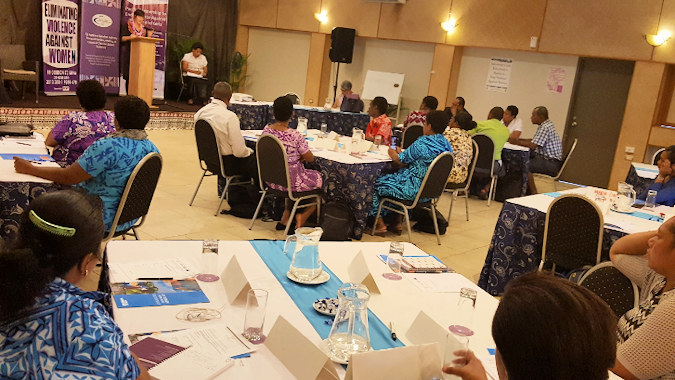
Pacific designed and led approaches
As a result of the initiative, five unique national SOPs and localised referral pathways are being developed. Some are already completed and are advancing to the early stages of implementation, while others are in the mid-phase of development such as in Samoa and Tonga.
Each country approach is specific to the national context, but all are based on the shared programme goal to ensure quality, survivor-centred services that ‘do not harm’. The SOPs for each country are, in alphabetical order:
- FIJI: Fiji Service Delivery Protocol (SDP) for Responding to Cases of Gender-Based Violence (GBV)
- In Fiji, development of the Service Delivery Protocol was supported by the National Taskforce on the National Elimination of Violence against Women and led by the Ministry for Women, Children and Poverty Alleviation (MWCPA), in partnership with UN Women Fiji Multi-Country Office (MCO) that continues its support through the Pacific Partnership.
- MWCPA and UN Women are also partnering for the 2019 national rollout, in collaboration with the Fiji Women’s Crisis Centre (FWCC)
- The SDP was launched in March 2018, then rolled-out nationally in 2019 via a five-month series of workshops, with the northern division training held at Labasa in August 2019, marking the end of phase-one of the national rollout. The series of rollout workshops was primarily funded by UN Women through the Pacific Partnership, and with additional support from the United Nations Population Fund (UNFPA) for the Labasa event.
Read more
- KIRIBATI: Kiribati Standard Operating Procedures for Gender-Based Violence Response
- The Kiribati Government through the Ministry of Women, Youth, Sport and Social Affairs (MWYSSA) leads the SafeNet network of government and non-government frontline service providers, which developed the Kiribati Standard Operating Procedures for Gender-Based Violence Response in partnership with UN Women, through the Pacific Partnership.
- Launched in November 2018, the Standard Operating Procedures are being printed and nationally rolled out in 2019-2020 under the Pacific Partnership.
- The Standard Operating Procedures form part of the national response to the 2010 Kiribati Family Health & Support Study, which documented the impact of GBV on Kiribati women and children.
- In Kiribati, the Pacific Partnership programme’s support, through UN Women, builds on previous joint programmes including the UN’s global Essential Services Package (ESP) that was piloted worldwide, including in Solomon Islands and Kiribati with support from UN Women and the United Nations Population Fund (UNFPA) and funding from the Australian Government.
Read more
- SAMOA: Interagency Essential Services Guideline
- In Samoa, the Ministry of Women Community and Social Development (MWCSD) is leading the development of Samoa’s first Interagency Essential Services Guideline, in partnership with UN Women Fiji Multi-Country Office (MCO) through the Pacific Partnership.
- MWCSD is being supported by UN Women to develop this document in 2019 as a collaborative effort between government agencies, civil society and other organisations. Additional technical inputs are being provided by UN agencies, including UNICEF and UNFPA.
Read more
- SOLOMON ISLANDS: SAFENET Guidebook of Standard Operating Procedures for the Multisectoral Response, Referral and Coordination of Sexual and Gender Based Violence
- In Solomon Islands, the Ministry of Women, Youth, Children and Family Affairs (MWYCFA) Women’s Development Division, leads the SAFENET Response and Referral Network (SAFENET) of government and non-government organizations who provide services for survivors of sexual and gender-based violence (SGBV), in partnership with UN Women through the Pacific Partnership.
- SAFENET’s survivor-centred approach is clearly outlined in the national SAFENET Guidebook of Standard Operating Procedures for the Multisectoral Response, Referral and Coordination of Sexual and Gender Based Violence.
- Developed and published in 2017, the Guidebook was officially launched in late 2018. The launch was followed by extensive provincial consultations across all nine provinces in 2019, to develop a national rollout plan, ensuring survivors at the provincial level have a localised SAFENET response, particularly in rural and remote areas.
- In Solomon Islands, the Pacific Partnership works in collaboration with UN agencies and partners, building on previous joint programmes such as the UN-Solomon Islands Government Joint Programme and the United Nations Joint Global Programme on Essential Services for Women and Girls Subject to Violence (Essential Services Package or ESP). The ESP was piloted worldwide, including in Solomon Islands and Kiribati led by UN Women with support from the United Nations Population Fund (UNFPA) and funded through the Australian Government.
Read more
- TONGA: National Service Delivery Protocol for Responding to Gender Based Violence
- Development of Tonga’s National Service Delivery Protocol for Responding to Gender Based Violence is led by the Ministry of Internal Affairs (MIA) Women Affairs Division (WAD), implemented in partnership with UN Women Fiji MCO through the Pacific Partnership, and supported by the Families Free of Violence (FFOV) programme.
- Initial dialogue and planning to develop Tonga’s Service Delivery Protocol began in April 2019 and continues to progress, led by government in partnership with civil society and partners.
- WAD is being supported by UN Women Fiji MCO to develop this document in 2019-2020 as a collaborative effort between government agencies, civil society and other organisations. Additional technical inputs are being provided by UN agencies, including UNICEF and UNFPA.
Read more on Facebook: MIA or UN Women
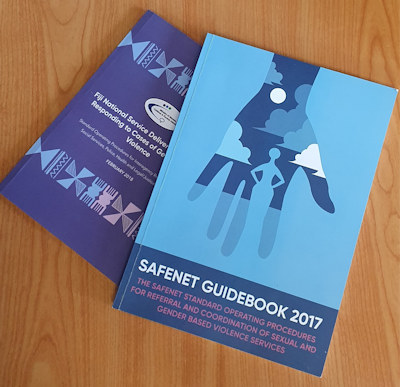
Related news
Featured Publication
This guidebook aims to standardize the approach to SGBV in direct services, referral support, coordination and prevention interventions amongst the member organizations. It describes, first and foremost, the SAFENET approach and the roles and responsibilities of each SAFENET member organization... Read more
Featured Publication
Fiji National Service Delivery Protocol for Responding to Cases of Gender Based Violence
Standard Operating Procedures for Interagency Response among Social Services, Police, Health and Legal/Justice providers... Read more
